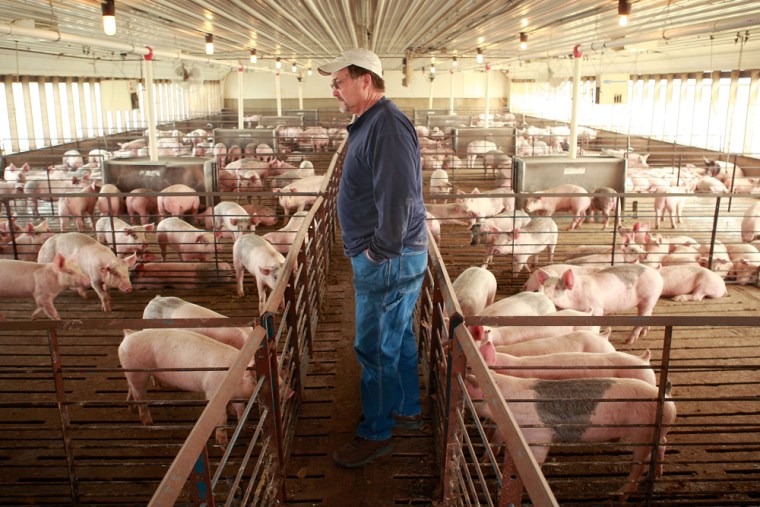Already grumbling about the false stigma of the name “swine flu,” pork farmers and agricultural officials have another message for Americans: Don’t infect our pigs.
Farm officials from Agriculture Secretary Tom Vilsack on down have urged health officials to ditch the name “swine flu,” pointing out that people can’t get the virus from pigs.
The U.S. pork industry generates $15 billion a year, but pig farmers say they’re being crippled by bans on exports of live pigs or pork meat imposed by 15 nations, including Russia, China, Thailand and Indonesia.
But “this really isn't swine flu,” Vilsack said this week. “It’s H1N1 virus. That’s very, very important.”
Those complaints are beginning to have an effect. The World Health Organization said Thursday that it would drop the shorthand name, saying it was needlessly confusing consumers. The European Union has already adopted the name “novel flu,” while the Canadian Health Ministry is considering a petition by the Canadian Pork Council rename the virus “North American flu.”
Charles Griffin, vice president of the Georgia Pork Producers Association, pointed to a report from the Centers for Disease Control and Prevention stressing that “there have been no isolations of any virus in any pigs anywhere in the world.”
“The only way transmission has been is [through] human to human contact,” Griffin said. “There is no danger from eating pork.”
In fact, health and agricultural officials agree, pigs have much more to fear from people humans than the other way around. Pigs, it turns out, can contract the virus from infected humans.
“We’re trying to minimize human traffic into our hog operation so our hogs do not get the disease from humans, which is probably a little bit of a twist from what most people have heard about,” said Elwyn Fitzke, a pork producer in Glenvil, Neb.
“This is a very big concern for us,” he added.
The National Pork Board sent an advisory counseling pork producers to implement what it called “biosecurity practices” — not to protect visitors, but to protect pigs.
Among the recommendations: Ban or limit outside visitors, double-check facilities’ ventilation and vaccinate all workers against seasonal flu viruses, so they don’t get sick and potentially weaken the pigs’ immune systems.
Charlie Miller, vice president of New York Pork Producers, the state’s industry trade group, said the reason was simple: America’s swine herds are perfectly healthy, thank you, and farmers want to keep them that way.
“We are very concerned about traffic through our buildings, and we have protocols that we follow to make sure we don’t bring diseases into our herds,” he said.
